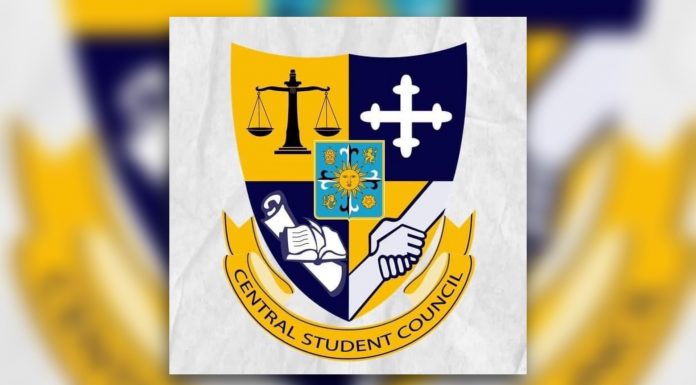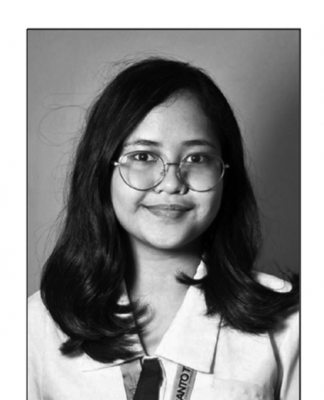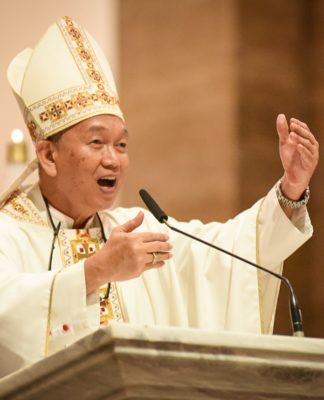 IT ALL started with a moving rebuttal on paper.
IT ALL started with a moving rebuttal on paper.
Former Overseas Filipino Worker (OFW) Rhoel Raymundo Mendoza was browsing a Riyadh newspaper more than two decades ago when he got enraged by a letter from a British reader: “Filipinos, because they have no culture of their own, tend to be a fickle and shallow people.”
He wasted no time writing an elaborate reply, defending his people who, he felt, had been maliciously slighted by some foreigner who didn’t know any better. He got his message across, earning a roundtrip ticket to London in 1987 for coming up with “the best letter to the editor.”
“I felt that it was my obligation to refute whatever unkind things people said about our country,” Mendoza told the Varsitarian.
The newspaper incident signaled the start of a new career for this graduate of UST advertising.
The graphic designer, who once thought of just earning green money to support a growing family back home, found another noble task as an OFW–building the image and promoting the welfare of his compatriots through several publications and media campaigns.
“I wanted to do something to help address the issues and concerns that affect our migrant workers,” Mendoza said.
“Year of the OFWs”
Buoyed by the fact that “OFWs are still very much taken for granted,” Mendoza launched “Project 2000,” a year-long signature campaign among overseas workers worldwide seeking to declare the millennium year as “The Year of the Overseas Filipino Workers” in 1999. The Philippines to the World Entertainment Foundation, Inc. (PWEFI), a non-profit organization Mendoza founded in 1997, served as a tool in reaching out to OFWs.
“Many supported the campaign because the overseas workers seemed to realize that it was time to have such kind of declaration in the Philippines,” Mendoza said.
In February 2000, Mendoza and the PWEFI got their wish when then President Joseph Estrada signed Proclamation No. 243 which officially marked the year 2000 as “The Year of the Overseas Filipino Workers.”
“The campaign was hoped to change [the marginalized stature of OFWs] or at least create more awareness about overseas workers,” Mendoza said.
In 1998, PWEFI also launched several campaigns such as “A Flag in Every OCW (Overseas Contract Worker) Home” and “Proudly Filipino” and sports tournaments as part of the Filipino community’s celebration of the Philippine centennial.
Adventurous soul
Life abroad could be very difficult for many overseas workers but people like Mendoza take hardships in stride by grabbing opportunities to grow and contribute to the well-being of fellow Filipino expats.
Mendoza left the country at 23 when he was offered a job to work in the Middle East in 1983. He worked as an advertising artist and photographer there where 90 percent of his colleagues were Filipinos.
“Being young and adventurous enabled me to brave working overseas,” Mendoza said. “My father was also there to look after me.”
Adjustment was easy for him, but being away from his family was one of the hardest things to endure. He kept in touch by sending letters and recorded voice tapes to them.
Mendoza returned to the Philippines in 1984 but flew back to Riyadh a year after and assumed a new job as an in-house graphic designer in a different company.
A singer by heart, Mendoza also actively performed in several fund-raising activities held at the Philippine and American Embassies, respectively as a member of a cultural group called the “Expatriate Performing Arts.”
His unwavering efforts to promote the Philippines earned him the Philippine Overseas Employment Administration Bagong Bayani Award in 1990.
“My contributions in fund-raising activities without expecting anything in return might have earned me the award. It was a big pride for me and my family,” Mendoza said.
In 1995, Mendoza published, through Entertainment Ventures Philippines, a magazine for overseas Filipinos called The Filipino Overseas Magazine, which, lasted for only three issues.
“I tried selling copies in the Philippines while I was abroad,” Mendoza said. “But due to lack of manpower, I had to stop the publication.”
The short-lived success of his maiden publication did not dampen his spirits. The turnout only inspired the publication of more OFW newsletters.
In 1998, Mendoza published Sentenaryo, a newsletter that contained the activities of the PWEFI during the centennial celebration, followed by OFW 2000 that recorded the highlights of the momentous declaration for the OFWs in 2000.
Global Pinoy, on the other hand, was published quarterly in 2005, five years after Mendoza finally came home to the Philippines.
“The newsletter was distributed among departing Filipinos at the Ninoy Aquino International Airport terminals for free,” Mendoza said.
Homecoming
Mendoza now owns RRM Models, Events, and Publications firm where his versatility in graphic design, desktop publishing and talent handling are utilized altogether.
After a 17-year overseas sojourn, the balikbayan occasionally looks back to his years abroad as “the best and most productive” of his life, having done something to contribute to the welfare of the migrant workers in ways he knew how.
“There is a sense of fulfillment whenever I do something for the OFWs in my own little way,” Mendoza said.
A proud Thomasian, he admitted that his upbringing as a Catholic instilled compassion in him to pursue goals that would reach out to the modern-day heroes. Mendoza also carried a Thomasian sense of pride, being able to launch goodwill campaigns and various publications until today.
Though he admitted that he was still “an OFW at heart,” Mendoza said he no longer wanted to work overseas, convinced that the 17 years of service to his family and fellow OFWs were already enough.
“I don’t want to be away from my family anymore,” he said.



















